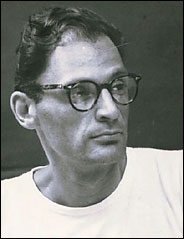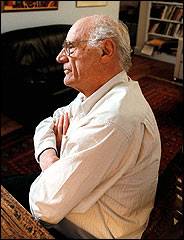onedomino
SCE to AUX
- Sep 14, 2004
- 2,677
- 482
- 98
-Arthur Miller, Moral Voice of American Stage, Dies at 89
By MARILYN BERGER
Published: February 11, 2005
http://www.nytimes.com/2005/02/11/theater/newsandfeatures/11cnd-miller.html (full text, may require registration)
Arthur Miller, one of the great American playwrights, whose work exposed the flaws in the fabric of the American dream, died Thursday night at his home in Roxbury, Conn. He was 89.
The cause was congestive heart failure, said Julia Bolus, his assistant.
The author of "Death of a Salesman," a landmark of 20th-century drama, Mr. Miller grappled with the weightiest matters of social conscience in his plays and in them often reflected or reinterpreted the stormy and very public elements of his own life - including a brief and rocky marriage to Marilyn Monroe and his staunch refusal to cooperate with the red-baiting House Un-American Activities Committee.
"Death of a Salesman," which opened on Broadway in 1949, established Mr. Miller as a giant of the American theater when he was only 33. It won the triple crown of theatrical artistry that year: the Pulitzer Prize, the New York Drama Critics' Circle Award and the Tony.

Arthur Miller in 1952
But the play's enormous success also overshadowed Mr. Miller's long career: "The Crucible," a 1953 play about the Salem witch trials inspired by his virulent hatred of McCarthyism, and "A View From the Bridge," a 1955 drama of obsession and betrayal, ultimately took their place as popular classics of the international stage, but Mr. Miller's later plays never equaled his early successes. Although he wrote a total of 17 plays, "The Price," produced on Broadway during the 1967-68 season, was his last solid critical and commercial hit.
Mr. Miller also wrote successfully in a wide variety of other media. Perhaps most notably, he supplied the screenplay for "The Misfits," a 1961 movie directed by John Huston and starring Monroe, to whom he was married at the time. He also wrote essays, short stories and a 1987 autobiography, "Timebends: A Life." His writing remained politically engaged until the end of his life.
But his reputation rests on a handful of his best-known plays, the dramas of guilt and betrayal and redemption that continue to be revived frequently at theaters all over the world. These dramas of social conscience were drawn from life and informed by the Great Depression, the event that he believed had a more profound impact on the nation than any other in American history, except, possibly, the Civil War. "In play after play," the drama critic Mel Gussow wrote in The New York Times, "he holds man responsible for his and for his neighbor's actions."
Elia Kazan, who directed "All My Sons," "Death of a Salesman" and "After the Fall," once recalled in an interview, "In the 30's and 40's, we came out of the Group Theater tradition that every play should teach a lesson and make a thematic point."
The Broadway producer Robert Whitehead, who worked frequently with Mr. Miller, said in reminiscing about their work together that he found a "rabbinical righteousness" in the playwright. "In his work, there is almost a conscious need to be a light unto the world," he said, adding, "He spent his life seeking answers to what he saw around him as a world of injustice."

1999
Broadway theaters dimmed their marquee lights last night at curtain time in his memory.